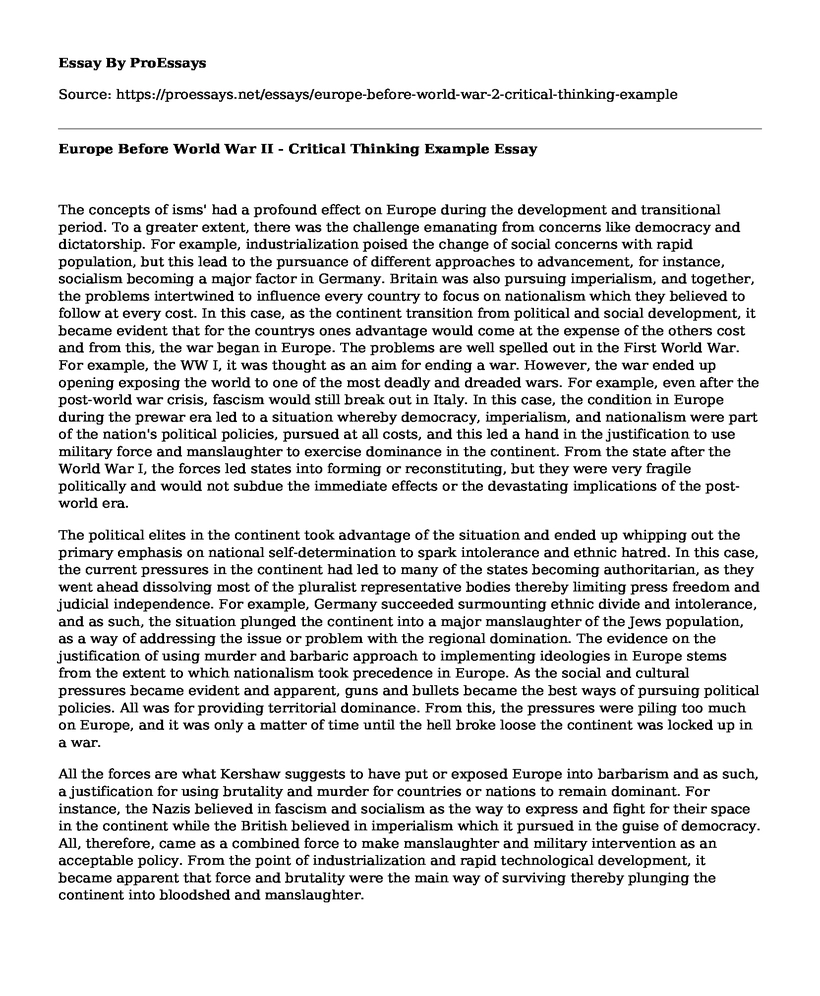The concepts of isms' had a profound effect on Europe during the development and transitional period. To a greater extent, there was the challenge emanating from concerns like democracy and dictatorship. For example, industrialization poised the change of social concerns with rapid population, but this lead to the pursuance of different approaches to advancement, for instance, socialism becoming a major factor in Germany. Britain was also pursuing imperialism, and together, the problems intertwined to influence every country to focus on nationalism which they believed to follow at every cost. In this case, as the continent transition from political and social development, it became evident that for the countrys ones advantage would come at the expense of the others cost and from this, the war began in Europe. The problems are well spelled out in the First World War. For example, the WW I, it was thought as an aim for ending a war. However, the war ended up opening exposing the world to one of the most deadly and dreaded wars. For example, even after the post-world war crisis, fascism would still break out in Italy. In this case, the condition in Europe during the prewar era led to a situation whereby democracy, imperialism, and nationalism were part of the nation's political policies, pursued at all costs, and this led a hand in the justification to use military force and manslaughter to exercise dominance in the continent. From the state after the World War I, the forces led states into forming or reconstituting, but they were very fragile politically and would not subdue the immediate effects or the devastating implications of the post-world era.
The political elites in the continent took advantage of the situation and ended up whipping out the primary emphasis on national self-determination to spark intolerance and ethnic hatred. In this case, the current pressures in the continent had led to many of the states becoming authoritarian, as they went ahead dissolving most of the pluralist representative bodies thereby limiting press freedom and judicial independence. For example, Germany succeeded surmounting ethnic divide and intolerance, and as such, the situation plunged the continent into a major manslaughter of the Jews population, as a way of addressing the issue or problem with the regional domination. The evidence on the justification of using murder and barbaric approach to implementing ideologies in Europe stems from the extent to which nationalism took precedence in Europe. As the social and cultural pressures became evident and apparent, guns and bullets became the best ways of pursuing political policies. All was for providing territorial dominance. From this, the pressures were piling too much on Europe, and it was only a matter of time until the hell broke loose the continent was locked up in a war.
All the forces are what Kershaw suggests to have put or exposed Europe into barbarism and as such, a justification for using brutality and murder for countries or nations to remain dominant. For instance, the Nazis believed in fascism and socialism as the way to express and fight for their space in the continent while the British believed in imperialism which it pursued in the guise of democracy. All, therefore, came as a combined force to make manslaughter and military intervention as an acceptable policy. From the point of industrialization and rapid technological development, it became apparent that force and brutality were the main way of surviving thereby plunging the continent into bloodshed and manslaughter.
Cite this page
Europe Before World War II - Critical Thinking Example. (2021, Jun 24). Retrieved from https://proessays.net/essays/europe-before-world-war-2-critical-thinking-example
If you are the original author of this essay and no longer wish to have it published on the ProEssays website, please click below to request its removal:
- The New Deal and the Relationship Between Individual Freedom and Government Action
- Paper Example on Immigration Policy Changes Due To the 9/11 Attack
- Compare and Contrast Essay Sample on Italian Identity and African American Identity
- The Corruption and How It Has Been Exposed: Research Paper
- Essay Sample on Andrew Jackson's Era: Democracy or Oppression?
- Essay Sample on Trump Proposes Ban on Flavored E-Cigarette Sales to Teens
- Free Essay Sample on Colonial Africa







